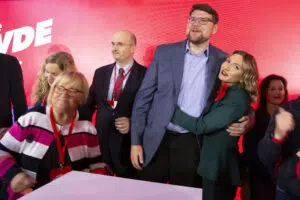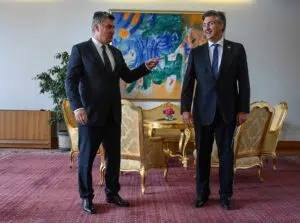Brussels – Everyone in Croatia is jubilating a bit after yesterday’s (April 17) early vote for the renewal of parliament. The real winner, however, is the post-election uncertainty over the formation of the next government. The outgoing prime minister, the conservative Andrej Plenković, is running for a third consecutive term, even though he lost key seats to continue with the current coalition and will have to enter difficult talks with the extreme nationalist right for the green light for a new executive. And because the Social Democrats led by the popular but controversial President of the Republic, Zoran Milanović, along with Možemo’s Green Left are yes on the rise and intent on exploring avenues to wrest power from the conservatives, but remain far from enough deputies in the Sabor to take the reins of post-election consultations right away.

With almost all ballots counted – and a record turnout at 61.83 percent – the results of early elections in Croatia show the confirmation of Plenković’s Croatian Democratic Union (HDZ) as the leading party with 34.42 percent of the vote, but down nearly three percentage points from four years ago and especially by five seats in Parliament (61 out of 151). A decisive drop that, despite claiming victory “convincingly” – the word of outgoing premier Plenković – does not allow the conservatives to continue with the traditional center-right coalition of the past eight years. The center-left coalition ‘Rivers of Justice’ led by the Social Democratic Party of Croatia (SDP) came in second, strengthening its position with 25.41 percent of the vote and 42 seats in the Sabor (+1), still far from the hoped-for first place at on the eve of the vote, however. “This is not over, people want change, and starting tomorrow we will begin talks,” SDP leader Peđa Grbin said.
More than a foregone third term for Plenković or upheaval on the left, the outcome of the polls points to a likely period of political instability in the opening super election year that will also see European elections (on June 9) and presidential elections (in December). That is why we need to look at the results of the other smaller parties, with which the two main political forces will have to seek understandings to avoid another return to the polls. First and foremost, the far-right nationalist party Movement for the Fatherland, which was confirmed in third place with 9.56 percent of the vote and 14 seats (-2) and which could become the needle in the balance for a new government that sways even more to the right, whether it goes in the direction of external support for an HDZ government or the more complex inclusion in the team of ministers. On the other hand, a dialogue with the ultra-conservatives of Most, rising to 8.02 percent (and 11 seats, three more than the legislature just ended), is more difficult. On the other side of the political spectrum, Možemo’s Green Left also saw growth of three seats (10, with 9.1 percent), allowing it to credit itself as a minority partner of the Social Democrats. However, the two forces would lack -at least- 14 deputies compared to the 76 needed for a parliamentary majority.
The political scenario in Croatia
Until the beginning of the year, Premier Plenković’s HDZ seemed headed for a quiet reappointment in the elections scheduled for the fall, until in early March, the same executive decided to anticipate them before the June European elections to try to limit the political damage of the wave of protests in major cities across the country. In addition to pressure from individual professional groups over dissatisfaction with Plenković cabinet policies –from teachers to judges and doctors over salaries to journalists against changes to the Criminal Code to make it a crime to publish leaks — it was the center and leftist parties that catalyzed the desire to “defend democracy.” In particular, the protests focused on the appointment of Ivan Turudić as prosecutor general with the green light from Croatian deputies (swearing-in took place on March 13) due to his proximity to the HDZ and Plenković’s possible protection from corruption cases should he lose his immunity after the election round.

From left: the president of Croatia, Zoran Milanović, and the outgoing prime minister, Andrej Plenković (credits: Denis Lovrovic / Afp)
What really disrupted the campaign, however, was President Milanović, who surprised voters by announcing his candidacy for Prime Minister as head of the Croatian Social Democrats. However, the Constitutional Court immediately declared Milanović’s candidacy unconstitutional if he did not first resign from the position he currently holds: a decision branded as “illiterate” by the president of the Republic, who continued to tour the country to campaign for the SDP and the center-left coalition. The President of the Republic, in office since 2020 and former premier between 2011 and 2016, is the most popular political figure in Croatia but his ambiguous rhetoric towards Russia and the war in Ukraine, as well as his relationship with the leader of Republika Srpska (the Serb-majority entity in Bosnia and Herzegovina), Milorad Dodik, and with the Hungarian prime minister, Viktor Orbán, make him a loose cannon for the younger, more progressive electorate.
Find more insights on the Balkan region in the BarBalkans newsletter hosted by Eunews
English version by the Translation Service of Withub






